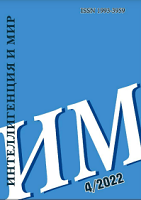Переписка в поздней античности: о роли некоторых курьеров Сидония в функционировании «эпистолярной сети» (по письмам IV. 4, IV. 7, IV. 12)
Correspondence in late antiquity: on the role of some couriers of Sidonius in the functioning of the “epistolary network” (from letters IV. 4, IV. 7, IV. 12)
Author(s): Elena Viktorovna Litovchenko, Elena A. SemichevaSubject(s): Social history, Ancient World
Published by: Ивановский государственный университет
Keywords: Late Antiquity; epistolography; epistolary network; intellectual elite; Sidonius Apollinaris; couriers;
Summary/Abstract: The article deals with the analysis of correspondence as the most demanded means of communication in Late Antique society, in the context of its evolution into an “epistolary network”, which included representatives of the intellectual elite of the Latin West of the 4th-6th centuries as correspondents, who maintained contacts through a regular exchange of letters. The author’s translation and analysis of the content of personal epistles of Sidonius Apollinaris, who represented the top of the Late Roman nobility, allows to understand the motivation of the Late Antique intellectual elite in choosing the mediators and to reconstruct some of the functioning mechanisms of the “epistolary networks” of the Late Antique world. On the base of microhistorical approach, the authors conclude that the letters demonstrate opposed attitude towards couriers, which is due to social and cultural differences between them. At the same time, the purpose of Sidonius’ letters was not so much to communicate, but to maintain channels of communication with important correspondents. The epistolary network made it possible to demonstrate one’s influence introducing the “postman” to another person. This was especially valuable in the transforming social and political situation of the Late Antique West during its decline in the 470s, when the usual status markers, primarily imperial posts, practically lose their significance, and social ties specifically could confirm a privileged position. The constantly circulating correspondence, as an occupation peculiar only to highly educated people, was a way to feel one’s exclusivity, to feel some stability of the usual way of life against the background of the general instability of the political situation.
Journal: Интеллигенция и мир
- Issue Year: 2022
- Issue No: 4
- Page Range: 9-24
- Page Count: 16
- Language: Russian

